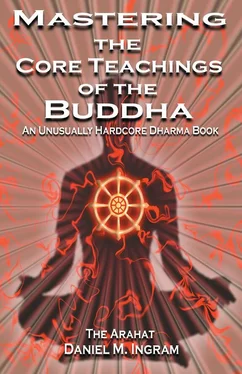Daniel Ingram - Mastering the Core Teachings of Buddha - An Unusually Hardcore Dharma Book
Здесь есть возможность читать онлайн «Daniel Ingram - Mastering the Core Teachings of Buddha - An Unusually Hardcore Dharma Book» весь текст электронной книги совершенно бесплатно (целиком полную версию без сокращений). В некоторых случаях можно слушать аудио, скачать через торрент в формате fb2 и присутствует краткое содержание. Год выпуска: 2009, ISBN: 2009, Издательство: Aeon Books, Жанр: Старинная литература, на русском языке. Описание произведения, (предисловие) а так же отзывы посетителей доступны на портале библиотеки ЛибКат.
- Название:Mastering the Core Teachings of Buddha - An Unusually Hardcore Dharma Book
- Автор:
- Издательство:Aeon Books
- Жанр:
- Год:2009
- ISBN:9781904658405
- Рейтинг книги:5 / 5. Голосов: 1
-
Избранное:Добавить в избранное
- Отзывы:
-
Ваша оценка:
- 100
- 1
- 2
- 3
- 4
- 5
Mastering the Core Teachings of Buddha - An Unusually Hardcore Dharma Book: краткое содержание, описание и аннотация
Предлагаем к чтению аннотацию, описание, краткое содержание или предисловие (зависит от того, что написал сам автор книги «Mastering the Core Teachings of Buddha - An Unusually Hardcore Dharma Book»). Если вы не нашли необходимую информацию о книге — напишите в комментариях, мы постараемся отыскать её.
Mastering the Core Teachings of Buddha - An Unusually Hardcore Dharma Book — читать онлайн бесплатно полную книгу (весь текст) целиком
Ниже представлен текст книги, разбитый по страницам. Система сохранения места последней прочитанной страницы, позволяет с удобством читать онлайн бесплатно книгу «Mastering the Core Teachings of Buddha - An Unusually Hardcore Dharma Book», без необходимости каждый раз заново искать на чём Вы остановились. Поставьте закладку, и сможете в любой момент перейти на страницу, на которой закончили чтение.
Интервал:
Закладка:
11. EQUANIMITY
Finally, we really begin to understand and surrender to the truth of things. We accept the truth of our actual human lives as they are at a deep level. All of the “stuff” that the Dark Night may have brought up may still be going on, but somehow it has lost its ability to cause real trouble. Equanimity is much more about something in the relationship to phenomena than anything specific about the phenomena themselves.
Equanimity can have sort of a rough start, strangely enough, as well as some mildly painful and irritating sensations, but the meditator feels that some barrier has finally broken, a weight has lifted and practice can continue.
203
The Progress of Insight
However, this stage can be such a relief after Re-observation that it is very tempting to solidify it into the fourth samatha jhana either because doing so is so nice or because of fear of falling back to Re-observation, which can easily occur. However, as I continue to mention, not investigating the qualities of this stage, such as peace, ease, and a panoramic perspective, causes failure to progress and makes falling back to Re-observation more likely.
The first vipassana jhana is about building up the basic skills of what is a physical sensations, what is a mental sensation, how they relate, and what the Three Characteristics feel like in practice. The Arising and Passing away is about seeing this very clearly and profoundly for the object of meditation. The Dark Night is about these insights then coming around to the background and seeing more complex emotional and psychological constructs of mental and physical sensations as they are. The fourth vipassana jhana, meaning this stage, is about seeing the true nature of even more complex, inclusive, subtle and fundamental things, like space, awareness, investigation, wonder, expectation, anticipation, peace, ease, questioning, and those sorts of things in ways that cut through the center and include the whole background and foreground as well.
This early stage can feel very familiar and “normal,” like we have remembered something simple and good from our childhood. If we felt weary of the world in the Dark Night, we may suddenly find that the world is just fine and may even be more engaged with it and excited about it than before. Again, these potentially radical mood swings can be very disorienting to those with whom we have close relationships. Try to be sensitive to this and their feelings. Confidence returns, but whereas there may have been a Rambo-like quality to it during stage 4. The Arising and Passing Away, now there is more of the cool, charming confidence of James Bond (sorry about the purely masculine images here).
Somewhere in here there can arise a tendency to see the world and those in it in very strange and unusual ways. I will give one example from my own experience, but realize that tremendous variation is possible here, so don’t take this too seriously. It is meant to try to convey a very general concept. I remember looking around me at all the 204
The Progress of Insight
people on retreat and even all the chickens, birds and puppies in the monastery, and seeing them all simultaneously as “little mush demons”
(little squat greenish creatures with big, sad mouths and eyes) and fully enlightened buddhas at the same time. They were both. In fact, we were both.
We were deluded and small, yet transcendent and luminous. I
could see in some very strange way exactly how each of them, including me, was caught in the world of form and confusion, trying to find happiness and yet doing so from such a small and frightened place, and yet all of this was vast buddha nature, all of this was the natural, luminous and compassionate dance of God. Such strange perspectives that try to resolve paradoxical insights do not always occur, but this is included here in case they do and perhaps to provoke knowing laughter from those with their own unique stories from this part of the path.
More sexual and stylized versions of these experiences can also explain where some of the more exotic tantric teachings come from.
Sometimes the early part of stage 11 can produce a real sense of freedom in the conventional sense, freedom from cares, worries, and even responsibilities and social conventions. One may sometimes feel that one is simply beyond everything, and it must be admitted that this is a wonderful feeling. It tends to fade quickly enough on its own, but it might be possible to get caught by it if one stopped practicing entirely.
Those who became spiritual fanatics or freaks after the A&P and during the Dark Night may now begin to act much more like their old selves, with their spiritual path being much less of a Big Holy Deal. About damn time…
Visions of bright lights may arise once more, but they are really more associated with stage 4, The Arising and Passing Away. Again, as with that earlier stage, the meditator is able to sit for longer and longer periods of time and begins to clearly perceive the Three Characteristics with spaciousness and breadth. The big difference is that the A&P is more about the object of meditation and Equanimity is much more about the whole sensate universe. There is less rapture and more equanimity than in the stage of the Arising and Passing Away. There are rarely if ever the spontaneous physical motions and odd breathing patterns that come with that earlier stage. Unfortunately, just to make 205
The Progress of Insight
things confusing, there is often a single double-dip unknowing event, with one being halfway down the breath and the other at the end of that breath, very soon after the shift from Re-observation to Equanimity.
In the early part of this stage, reality may appear a bit “chunky” for a while, and practice may seem quite possible but may seem to require steady but sustainable work. If one is tired, one may begin having dropouts that are similar to what occurred in Dissolution but more extreme. It may be hard to read and pay attention, hard to listen to people and hear, hard to notice where one is and what one is doing.
The arising of some sort of fear of madness and death is not uncommon at this stage, but usually does not cause too much trouble and may even seem comical or welcome. A related and common feeling in the early part of this stage is the general sense that something big is about to happen, though this feeling is also common before the A&P
Event. These feelings are worthy of sensate investigation in a wide and inclusive way.
Reality can now be perceived with great breadth, precision, and clarity, and soon with no special effort. This is called “High Equanimity.” Vibrations may become predominant, and reality may become nothing but vibrations. Vibrating formless realms may even arise, with no discernable image of the body being present at all. It may feel like reality is trying to synchronize with itself, and that is exactly correct. Investigate this feeling. Phenomena may even begin to lose the sense that they are of a particular sense door, and mental and physical phenomena may appear nearly indistinguishably as just vibrations of suchness, sometimes referred to as “formations.”
I put off writing about formations for a long time, as they are a conceptually difficult topic. Further, the classical definition of formations is perhaps not so clear-cut, so I wondered about imposing my own functional and experiential definitions on the term. However, as the topic of formations has arisen in so many conversations recently, I thought that it would be worth taking on despite the difficulties.
I am going to define formations as the primary experience of insight meditation when one is solidly in the fourth vipassana jhana, the 11th ñana, High Equanimity, whose formal title is actually Knowledge of Equanimity Concerning Formations. For those of you who find this 206
Читать дальшеИнтервал:
Закладка:
Похожие книги на «Mastering the Core Teachings of Buddha - An Unusually Hardcore Dharma Book»
Представляем Вашему вниманию похожие книги на «Mastering the Core Teachings of Buddha - An Unusually Hardcore Dharma Book» списком для выбора. Мы отобрали схожую по названию и смыслу литературу в надежде предоставить читателям больше вариантов отыскать новые, интересные, ещё непрочитанные произведения.
Обсуждение, отзывы о книге «Mastering the Core Teachings of Buddha - An Unusually Hardcore Dharma Book» и просто собственные мнения читателей. Оставьте ваши комментарии, напишите, что Вы думаете о произведении, его смысле или главных героях. Укажите что конкретно понравилось, а что нет, и почему Вы так считаете.












